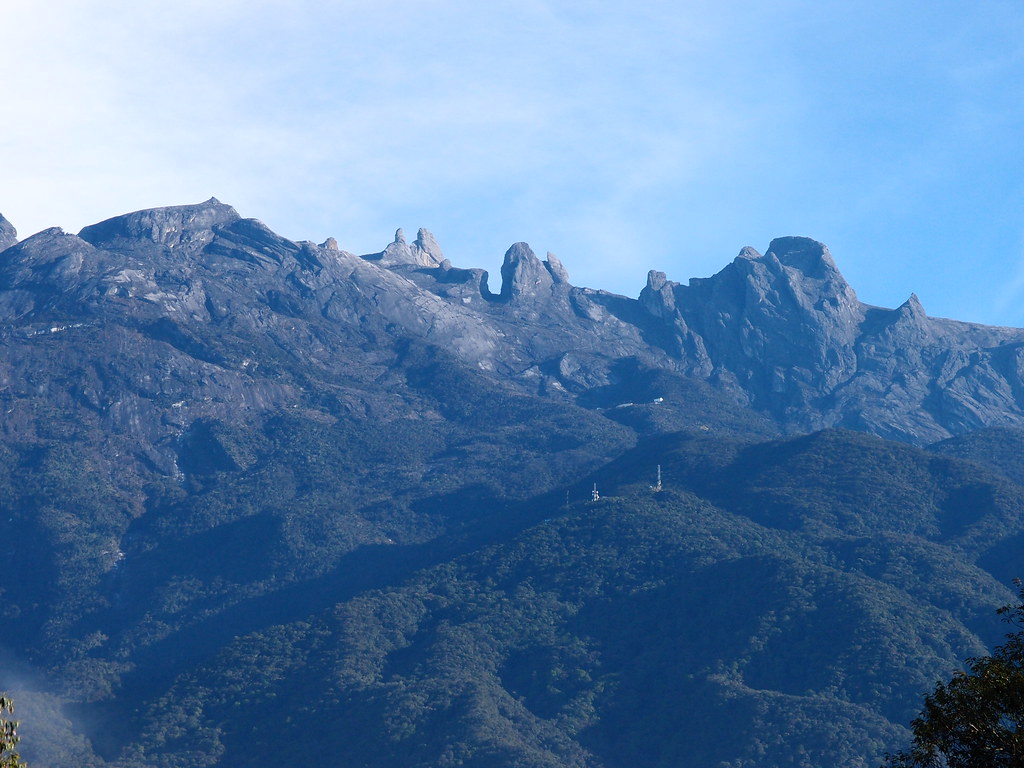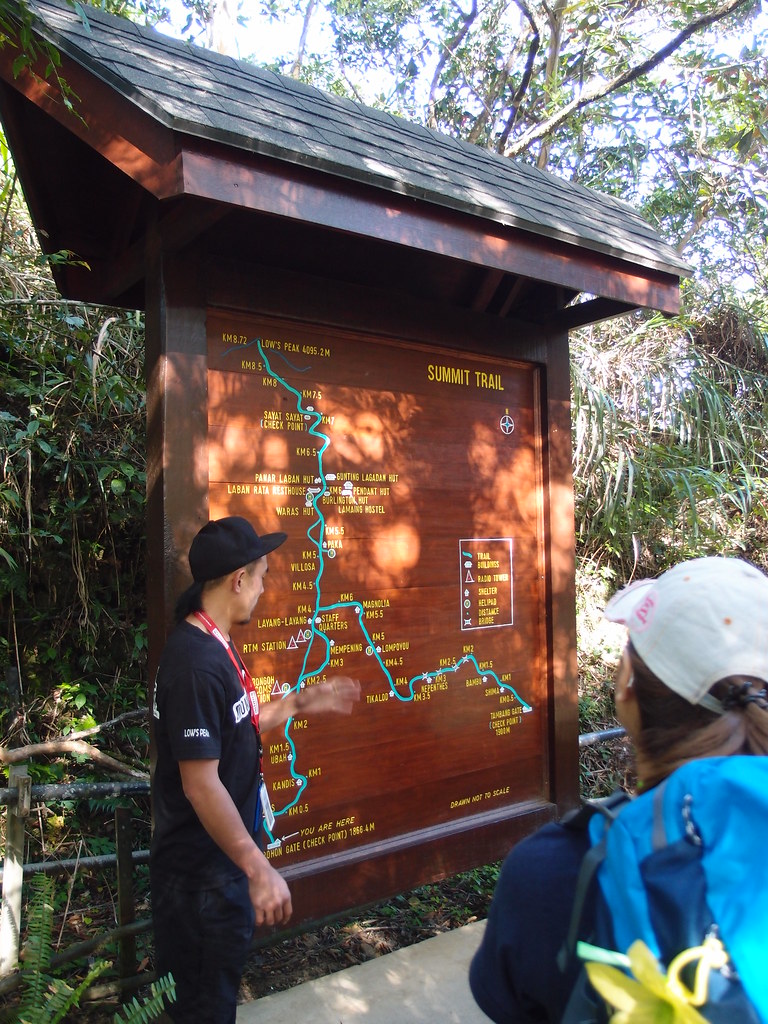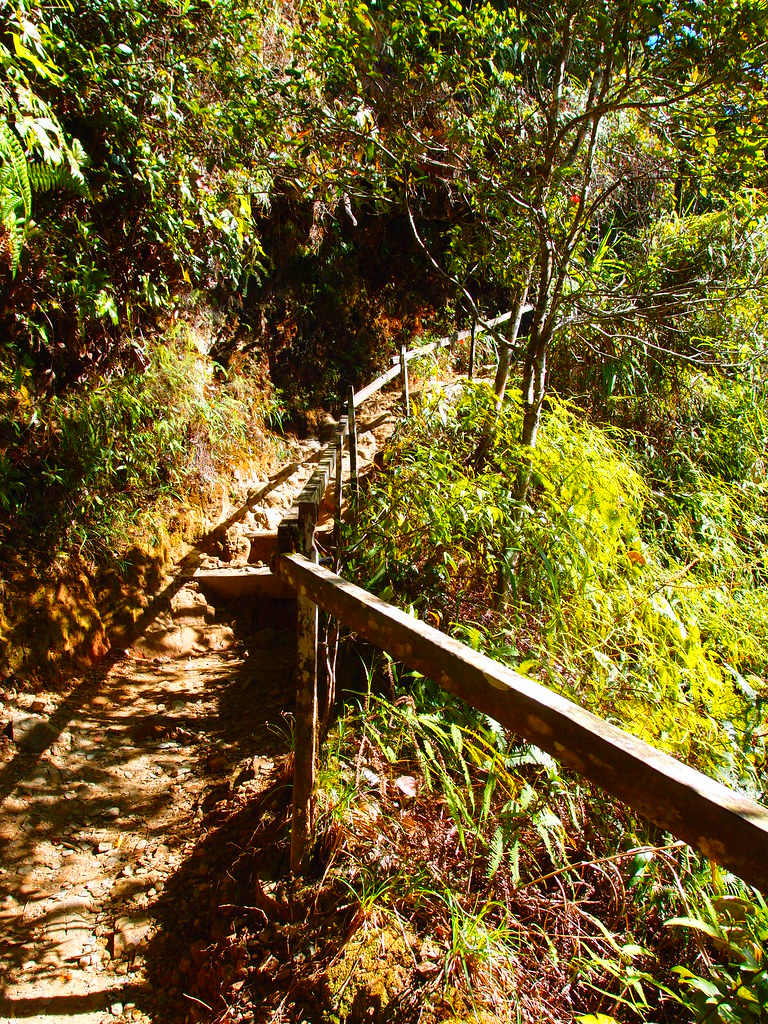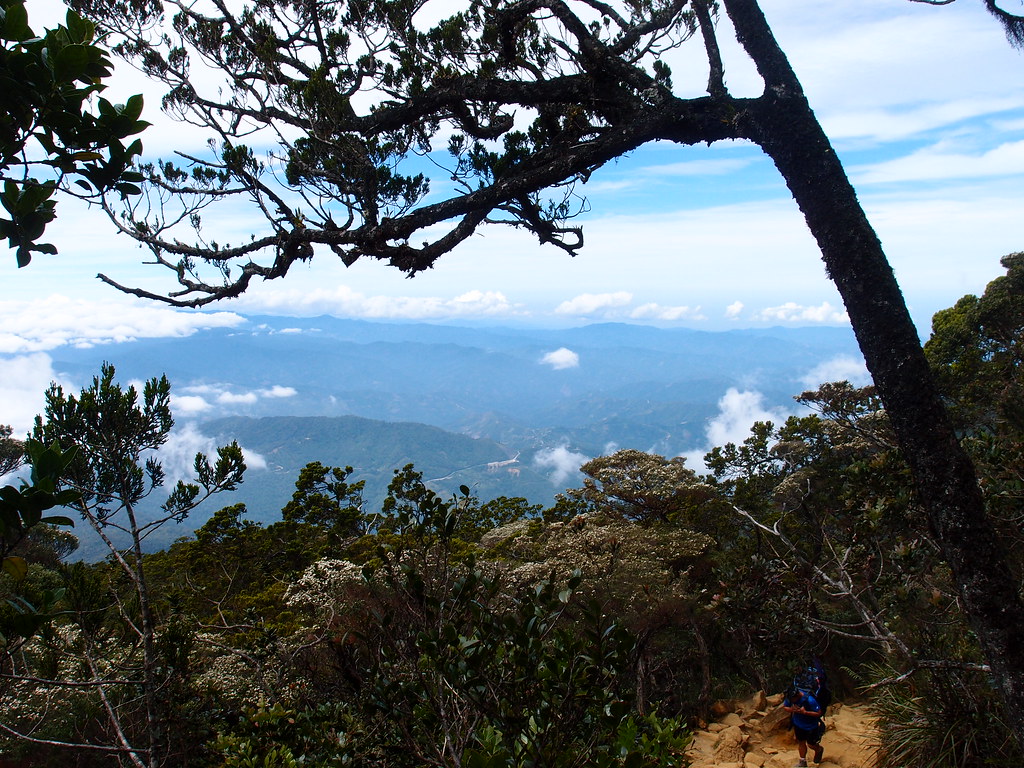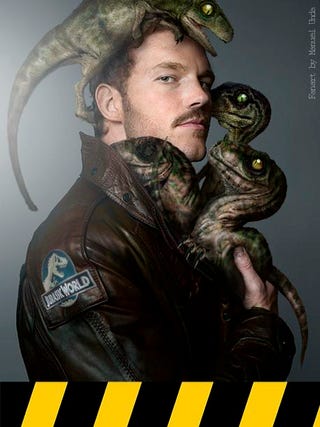(The story starts back here. I could have sworn I'd typed up the next chapter on the overnight train from Kuala Lumpur, but I can't find it anywhere, so I am continuing as recollected.)
I wake up at an ungodly hour and semi-check out, leaving most of my luggage behind. Downtown Kinabalu is quiet, and the tour company's van picks me up for the two-hour drive to the national park. As the van leaves the city and meanders through the countryside, I start up a brief conversation with an American, a weightlifter type, and his Asian (but not Malaysian) girlfriend. For me, it's my first and biggest challenge of the trip; for them, it's one of many. The American's got a couple of walking sticks, for his bad knees, and pays to have his and his lady's bags ported up to the overnight hostel. I can appreciate that it's an affordable solution when your travel plans won't let you leave the bags in the city, but it still strikes me as odd and slightly presumptuous. You don't need your luggage for a two-day, one-night climb.
At the base camp, I get my mountain ticket and meet Byron, my guide. The park regulations mostly prohibit solo climbing, and my schedule is not conducive to finding clever workarounds - I'm not part of a group, so I've been issued a personal minder. As I stand in the parking lot with my packed lunch (cheese on white bread and an apple - maximally inoffensive), I look up at the towering Kinabalu. There must be something I'm missing. There's no way I'm climbing all the way up there, on foot, today!
We're shuttled to the park entrance, and I pass by my last chance to rent a hiking pole. I consider it, but am not sure, and then they run out. This will turn out to be a big oversight on my part; but for now it's morning, the sun is shining, it's not too hot, and I am full of energy. As we start up the trailhead at 1800 meters above sea level, I ask Byron if it's okay that we go on ahead. The others from my van are moving slowly, and I might as well take advantage of having a personal guide. It's not so much that I'm in a hurry - I just like hiking alone, at my own pace and with my own thoughts, without adjusting to others. Byron is happy to follow behind - his capabilities obviously far exceed any pace I can set. For a while, it's a pleasant climb, as we pass the porters going up and down the mountain with heavy loads, boxes of supplies for the hostel, luggage, and even giant cannisters of pressurized cooking gas, strapped to their backs valve-side down, like a third-world jetpack.
The first tourists we meet are a group of drenched Aussies sprinting downhill. Their guide follows behind, winded, exchanging discernible gasps of exasperation with Byron. The young Aussies are obvious professionals, mountain runners, from the same clique that comes here every year to set records. There's a plaque down at the park gate, displaying last year's top times. It will take me somewhere between four or five hours just to get to the overnight spot, then more to reach the summit in the darkness, and the rest of tomorrow to get back down. The record holder, a Spaniard, made it all the way to the peak and back... in under three hours, total.
There is a dozen-odd rest areas on the way up the trail, some more elaborate than others. For the first major section, I am happy with my pace - I may not have strength, but I like to think I have stamina. By the time we break for lunch, there's a respectable flow of last night's tourists coming downstream. The undisputed king of the lunch spot is a wiry old Englishman wearing several sweaters and a thick wool hat with floppy ears, a one-man ambulatory sauna. He tells us stories of bumming around South-East Asia with the missus on a creaky old sailboat, as well as his old mates from back home - including a tragic physician who desperately tried to recapture his wife's affections. "The poor dumb sod, he slept with one of the nurses and told his wife." (I wait one heartbeat and deadpan: "That's his mistake right there. He should have slept with his wife and told one of the nurses.")
I refill my metal canteen at the only waterhose that Byron dares recommend to a foreigner, and we continue uphill. Now it's a different story, though. I may have rested and eaten, but the upper part of the trail is significantly steeper. The cheer drains from me as my legs burn, but I have no choice except to push on. I stop bantering with Byron and focus only on the road ahead, and above me. I'm carrying my phone and earbuds, but I feel it would be rude to use them for distraction, so I let my mind focus on the drumbeat of random lyrics from a Lordi song. Onward and upward, only occasionally glancing back down the hill to measure my progress - by this time we are out of the jungle and there is some sort of view, although the fog has rolled in to obscure most of it. Byron urges me to rest, but my stubbornness wins out. I don't think I can afford to lose inertia, or I'll never be able to start back up again. I'd quit if that were an option, but this is not Mount Etna or Vesuvius, there is no overpriced cable-car option. It's Malaysia, it's Borneo, it's a mountain that admits us tourists on sufferance. The overnight hostel is closer than base camp, is all that matters.
Eventually I can't take it any more. It's Sunday afternoon in local time, and the last decent sleep I had was on Thursday. I've barely had any dinner, I've not had any breakfast, I've spent the previous day walking around Hong Kong, I've been up since five in the morning, and the two slices of plain white bread with even plainer cheese have not made a difference. Exhausted in a way I can't ever remember being, with no physical or mental stamina left, I sit down on a rock just off the seemingly near-vertical path and turn around to look out at Asia sprawling before me. I reach into my backpack, pull out my box of Pocky and wolf it down, waiting for the blessed rush of sugar, palm oil and processed carbohydrates to revive me. I close my eyes and just sit there, drained.
Byron waits patiently for a subjective eternity - maybe twenty minutes by the wall clock - and urges me on. I sigh and recommence climbing.
Just over the next crest is Laban Rata. Now I can rest.
I wake up at an ungodly hour and semi-check out, leaving most of my luggage behind. Downtown Kinabalu is quiet, and the tour company's van picks me up for the two-hour drive to the national park. As the van leaves the city and meanders through the countryside, I start up a brief conversation with an American, a weightlifter type, and his Asian (but not Malaysian) girlfriend. For me, it's my first and biggest challenge of the trip; for them, it's one of many. The American's got a couple of walking sticks, for his bad knees, and pays to have his and his lady's bags ported up to the overnight hostel. I can appreciate that it's an affordable solution when your travel plans won't let you leave the bags in the city, but it still strikes me as odd and slightly presumptuous. You don't need your luggage for a two-day, one-night climb.
At the base camp, I get my mountain ticket and meet Byron, my guide. The park regulations mostly prohibit solo climbing, and my schedule is not conducive to finding clever workarounds - I'm not part of a group, so I've been issued a personal minder. As I stand in the parking lot with my packed lunch (cheese on white bread and an apple - maximally inoffensive), I look up at the towering Kinabalu. There must be something I'm missing. There's no way I'm climbing all the way up there, on foot, today!
We're shuttled to the park entrance, and I pass by my last chance to rent a hiking pole. I consider it, but am not sure, and then they run out. This will turn out to be a big oversight on my part; but for now it's morning, the sun is shining, it's not too hot, and I am full of energy. As we start up the trailhead at 1800 meters above sea level, I ask Byron if it's okay that we go on ahead. The others from my van are moving slowly, and I might as well take advantage of having a personal guide. It's not so much that I'm in a hurry - I just like hiking alone, at my own pace and with my own thoughts, without adjusting to others. Byron is happy to follow behind - his capabilities obviously far exceed any pace I can set. For a while, it's a pleasant climb, as we pass the porters going up and down the mountain with heavy loads, boxes of supplies for the hostel, luggage, and even giant cannisters of pressurized cooking gas, strapped to their backs valve-side down, like a third-world jetpack.
The first tourists we meet are a group of drenched Aussies sprinting downhill. Their guide follows behind, winded, exchanging discernible gasps of exasperation with Byron. The young Aussies are obvious professionals, mountain runners, from the same clique that comes here every year to set records. There's a plaque down at the park gate, displaying last year's top times. It will take me somewhere between four or five hours just to get to the overnight spot, then more to reach the summit in the darkness, and the rest of tomorrow to get back down. The record holder, a Spaniard, made it all the way to the peak and back... in under three hours, total.
There is a dozen-odd rest areas on the way up the trail, some more elaborate than others. For the first major section, I am happy with my pace - I may not have strength, but I like to think I have stamina. By the time we break for lunch, there's a respectable flow of last night's tourists coming downstream. The undisputed king of the lunch spot is a wiry old Englishman wearing several sweaters and a thick wool hat with floppy ears, a one-man ambulatory sauna. He tells us stories of bumming around South-East Asia with the missus on a creaky old sailboat, as well as his old mates from back home - including a tragic physician who desperately tried to recapture his wife's affections. "The poor dumb sod, he slept with one of the nurses and told his wife." (I wait one heartbeat and deadpan: "That's his mistake right there. He should have slept with his wife and told one of the nurses.")
I refill my metal canteen at the only waterhose that Byron dares recommend to a foreigner, and we continue uphill. Now it's a different story, though. I may have rested and eaten, but the upper part of the trail is significantly steeper. The cheer drains from me as my legs burn, but I have no choice except to push on. I stop bantering with Byron and focus only on the road ahead, and above me. I'm carrying my phone and earbuds, but I feel it would be rude to use them for distraction, so I let my mind focus on the drumbeat of random lyrics from a Lordi song. Onward and upward, only occasionally glancing back down the hill to measure my progress - by this time we are out of the jungle and there is some sort of view, although the fog has rolled in to obscure most of it. Byron urges me to rest, but my stubbornness wins out. I don't think I can afford to lose inertia, or I'll never be able to start back up again. I'd quit if that were an option, but this is not Mount Etna or Vesuvius, there is no overpriced cable-car option. It's Malaysia, it's Borneo, it's a mountain that admits us tourists on sufferance. The overnight hostel is closer than base camp, is all that matters.
Eventually I can't take it any more. It's Sunday afternoon in local time, and the last decent sleep I had was on Thursday. I've barely had any dinner, I've not had any breakfast, I've spent the previous day walking around Hong Kong, I've been up since five in the morning, and the two slices of plain white bread with even plainer cheese have not made a difference. Exhausted in a way I can't ever remember being, with no physical or mental stamina left, I sit down on a rock just off the seemingly near-vertical path and turn around to look out at Asia sprawling before me. I reach into my backpack, pull out my box of Pocky and wolf it down, waiting for the blessed rush of sugar, palm oil and processed carbohydrates to revive me. I close my eyes and just sit there, drained.
Byron waits patiently for a subjective eternity - maybe twenty minutes by the wall clock - and urges me on. I sigh and recommence climbing.
Just over the next crest is Laban Rata. Now I can rest.
